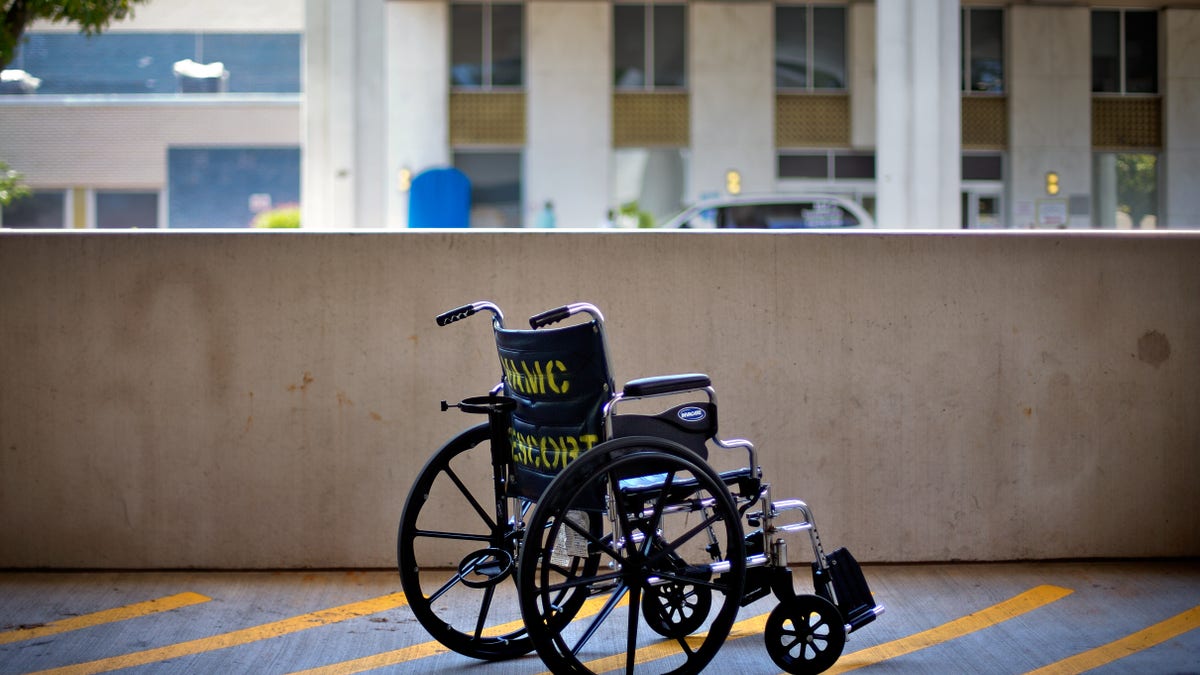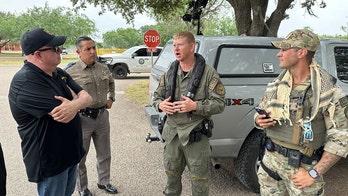
May 24, 2013: A wheelchair sits outside the Atlanta VA Medical Center in Atlanta. An internal investigation released in June 2014 that looked at wait times for all sorts of care across the VA system showed that new mental health patients were routinely forced to wait a month or more to start treatment. Not one of the 141 medical systems examined was able to meet the department's goal of getting all new mental health patients an appointment within 14 days. (AP/David Goldman, File) (AP2013)
Throwing millions of dollars in "outlandish" bonuses around helped create a dangerous culture within the Department of Veterans Affairs - particularly at the Arizona office - where financial incentives trumped patient care, lawmakers said Friday.
House Committee on Veterans’ Affairs Chairman Jeff Miller, R-Fla., led the grilling of Gina Farrisee, the VA’s assistant secretary for human resources and administration, zeroing in on a bonus system that saw about $10 million awarded to executives at the Phoenix VA Health Care System alone over a three-year period. In total, the VA gives out an estimated $400 million per year in performance bonuses.
“Knowing what we know now, about the fraudulent actions being taken at facilities all across this country that have harmed our veterans, do you think that the department’s assessment that 100 percent of senior managers at VA have been fully successful in the past four years is in line with reality?” Miller asked.
Despite revelations that veterans died languishing on waiting lists and some of the lists were even hidden, at least 65 percent of its senior executive workforce received the bonuses, said Miller.
“As the committee’s investigation into the department continues, and new allegations and cover-ups are exposed, it is important that we examine how the department has arrived at the point where it is today,” Miller said in prepared remarks. “Sadly, it’s a point which has eroded veterans’ trust and America’s confidence in VA’s execution of its mission. Part of the mistrust centers on a belief that VA employees are motivated by financial incentives alone, and I can see why.”
[pullquote]
Farrisee acknowledged the need to hold VA employees and supervisors accountable, particularly regarding performance, but defended the pay bonuses.
“We must recruit and retain the best talent, many of whom require special skills in health care, information technology, management and benefits delivery,” Farrisee testified. “In particular, VA requires talented senior executives to manage the complex set of facilities and programs that VA is responsible to administer.
“Performance plans are the foundation of accountability not only for senior executives but for the entire workforce,” Farrisee’s prepared remarks continued. “Senior leadership engagement in managing executive performance plans, including counseling and mid-year assessments, also serves as the model for the general schedule workforce.”
Farrisee, who joined the agency in September, admitted to Miller that not a single member of its senior executive service – a pool of 470 individuals – received less than a fully satisfactory or successful rating. She acknowledged that the VA's recently exposed problems don't jibe with an agency rewarding employees for stellar work.
“Mr. Chairman, if we knew what we knew today at that time, it is unlikely that their performance would have reflected what it reflected at the time the reports were written,” Farrisee responded.
Newly-released documents from the VA indicate that 2,100 employees received bonuses over the course of a three-year period, the Arizona Republic reported Tuesday. The records indicated that the bonuses kept increasing, with the VA paying $2.5 million in 2011, $3.5 million in 2012 and $3.9 million last year. The merit-based awards were doled out to nearly 650 employees, including doctors, nurses, secretaries and cleaning staff.
A report by the VA inspector general found that 1,700 veterans seeking treatment at the Phoenix VA hospital were at risk of being “lost or forgotten” after being kept off the official waiting list. Director Sharon Helman and two others were later placed on administrative leave amid allegations of manipulated records and accusations that some veterans may have died waiting for appointments.
Helman, who earns $169,000 annually, saw her $4,900 bonus from last year rescinded by federal VA officials. She told The Associated Press last month that she was appalled by the claim she would manipulate wait times and threaten patient’s lives solely to collect a bonus.
Federal lawmakers, meanwhile, have indicated they intend to craft legislation that would ban VA bonuses. Nationwide, VA medical centers reportedly misrepresented or sidetracked scheduling for more than 57,000 former military personnel. Roughly 64,000 veterans were not even registered in the VA’s electronic appointment waiting list, the Arizona Republic reports.
“It is highly disturbing that while patient care suffered, bonus pay skyrocketed,” U.S. Sen. John McCain told the Arizona Republic. “This must be the subject of a full investigation – in addition to the FBI investigation that is ongoing – and serves as another example of the systemic, cultural problem at the VA that must be addressed.”
The Associated Press contributed to this report.




